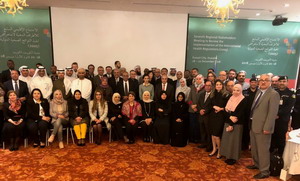 27 December 2018 ─ “We must work together to make the world better prepared for health emergencies by measurably improving the resilience of our health systems,’’ was the core message conveyed from Regional Director Dr Ahmed Al-Mandhari to participants at the seventh regional stakeholders meeting to review the Implementation of International Health Regulations (2005), held in Kuwait from 18 to 20 December.
27 December 2018 ─ “We must work together to make the world better prepared for health emergencies by measurably improving the resilience of our health systems,’’ was the core message conveyed from Regional Director Dr Ahmed Al-Mandhari to participants at the seventh regional stakeholders meeting to review the Implementation of International Health Regulations (2005), held in Kuwait from 18 to 20 December.
The message was delivered by Dr Rana Hajjeh, Acting Director of Programme Management at the WHO Regional Office, during the opening of the meeting.
Over 100 participants attended, including representatives from ministries, the US Centre for Disease Control and Prevention, the UN Food and Agriculture Organization of the United Nations (FAO), the International Civil Aviation Organization (ICAO), Eastern Mediterranean Public Health Network (EMPHNET) and the International Air Transportation Association, alongside WHO experts and IHR Regional Assessment Commission members.
The meeting provided an opportunity for participants to exchange their experiences of National Plans for Health Security (NAPHS) and engage in comprehensive group discussions. EMRO’s One Health Initiatives, regional plans to support IHR requirements at points of entry, cross border collaboration, ways to enhance the framework for communicating risk and the mapping of hazards across the Region were among the topics discussed.
Many of those attending took part in a poster session in which participants graphically displayed IHR related progress, including simulation exercises, outbreak reviews, communication and coordination and other examples of public health preparedness and response.
“I am thrilled to see invaluable contributions and recommendations from our stakeholders to reinforce our efforts for a full implementation of IHR. The meeting was critical for us to see where we are and where we want to be. Of the 22 countries in the Region, 17 conducted Joint External Evaluations and 12 prepared National Action Plans for Health Security. Even so, we are returning home with much work for 2019,” said Dr Dalia Samhouri, Health Emergency Preparedness and IHR Programme Area Manager.
Closing the meeting, the IHR Regional Assessment Commission commended the high level of participation from States Parties of the Region and their active engagement in defining the way forwards to implementing IHR (2005).
The Commission encouraged countries to organize more exercises to identify and plug any gaps in preparedness, and the WHO to provide technical support for risk communication. It also welcomed the inclusion of One Health Initiatives in national planning.
The regional stakeholders meeting concluded with a certificate ceremony during the course of which the hard work of countries taking part in the poster session was singled out for particular commendation. Participants nominated Sudan as recipient of the best poster certificate.





